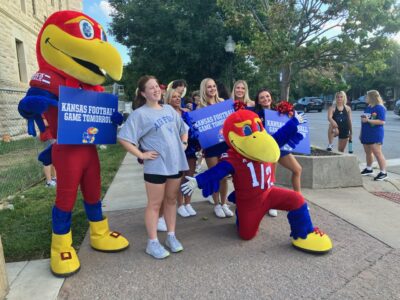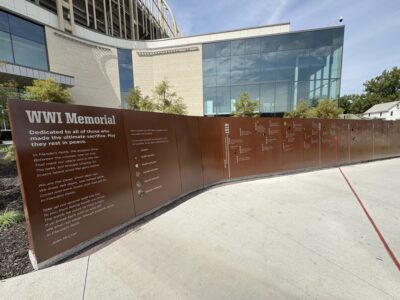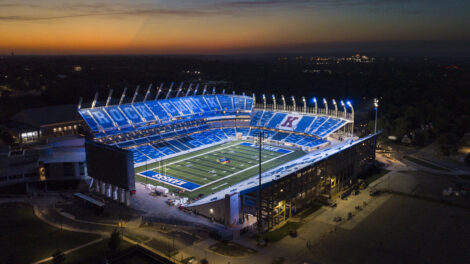KU exploring creation of Kansas Center for Energy Production; Regents approve tuition increases for next year
Phase out of two KU degrees also approved

photo by: Chad Lawhorn/Journal-World
Lawrence resident and Kansas Board of Regent member Wint Winter, center, speaks at Wednesday's monthly meeting of the Regents. Winter is one of three Regents who have terms expiring at the end of the month.
The summer season is sometimes dreaming season at the state’s universities, and KU has added the idea of a multimillion-dollar center to spur the production of energy in Kansas to its wish list.
A request for $10 million in state funding to help create the Kansas Center for Energy Production on KU’s Lawrence campus is among more than 20 ideas that potentially could be submitted to the Kansas Legislature next year for future funding.
The Kansas Board of Regents on Wednesday received its first look at potential projects from universities across the state. The list is in preparation for the Regents submitting their official budget request for the state’s 2027 fiscal year, which begins in July 2026 and will be debated in the legislative session that begins in January.
University of Kansas Chancellor Douglas Girod said a center that works to make Kansas a larger player in the world of energy production might be a project that state legislators are interested in funding.
“We really don’t have something like it in Kansas, and given our situation, we should,” Girod said in an interview with the Journal-World.
The situation Girod was referring to includes Kansas’ geographic location that creates advantages for transporting energy throughout the country, and also the state’s strong access to several natural resources. Wind energy has been a much talked about natural resource for energy production, but KU researchers also have touted the state’s potential to create “green hydrogen,” which could become an important energy source in the future.
In 2023, KU and a coalition of partners were a finalist for an approximately $1 billion federal grant to develop a green hydrogen industry in the state. Green hydrogen refers to using renewable energy — like wind and solar — to produce hydrogen gas, which is an extremely clean-burning source of fuel.
Leaders have touted Kansas as a natural location for the industry because the state has good wind and solar energy potential, and uniquely, the state has some of the largest underground salt deposits in North America. Those salt deposits could be used to store the green hydrogen underground until the gas is needed. The need for large amounts of water to create hydrogen potentially is a challenge for Kansas, but researchers at the Kansas Geological Survey have suggested there are portions of western Kansas that have sufficient groundwater reserves to feasibly produce large amounts of green hydrogen.
Girod said the Kansas Geological Survey, which is based on KU’s West Campus in Lawrence, would be a key partner in any future center. But so too would be KU’s engineering school, and particularly the school’s well-regarded petroleum engineering department, as the center would not exclusively focus on renewable energy sources.
The green hydrogen idea, though, is a likely one to get more attention from any future center.
“It is such a great opportunity to not only be a leader in the country, but to create a new economy in western Kansas,” Girod said.
The center, however, is a long way from reality. The Regents in September are expected to narrow the list of more than 20 projects submitted by the state’s universities. University leaders were warned on Wednesday that the list may be significantly reduced before it goes to the Legislature.
Existing proposals to boost university employee pay and to increase student financial aid are expected to receive strong consideration from the Regents, limiting how many new projects will get considered. University leaders also were told that legislators — heading into a big election year and an uncertain economy — may be very reluctant to spend much in the next session.
“I expect a very, very tight budget,” Regents President and CEO Blake Flanders told the chancellor and presidents of the state’s universities on Wednesday. “I think we just need to plan accordingly.”
In other business, the Regents on Wednesday:
• Approved tuition and fee increases for KU and other state universities. As the Journal-World reported last month, KU is proposing a nearly 3% increase in tuition and fees for the next school year. KU’s proposal was near the middle of the pack in terms of a percentage increase, but as the largest university in the state, KU continues to have the highest tuition and required fees of the state’s public universities. Here’s a look at the approved tuition and required fee increases for a typical undergraduate in-state student at the various universities:
• KU: $6,317, up $175 or 2.9%
• Kansas State: $5,789, up $179 or 3.2%
• Wichita State: $4,973, up $131 or 2.7%
• Pittsburg State: $4,299, up $99 or 2.4%
• Emporia State: $3,607, up $30 or 0.8%
• Fort Hays State: $3,055, up $94 or 3.2%
Regents were presented with the tuition and fee increase proposals last month, and unanimously approved them at Wednesday’s meeting.
• University leaders were told that there are signs of some international students facing new challenges in getting a student visa to enroll in U.S. universities. The biggest challenge: Getting an appointment at a U.S. embassy.
Karl Stumo, a vice president for student affairs at Pittsburg State and chair of the Regents’ Council of Student Affairs Officers, said that international students who have been seeking appointments with U.S. embassy staff in their countries are often being told that no appointments are available. International students are required to meet with a U.S. embassy staff member in order to receive a student visa to travel to America.
Stumo, however, said that students who had arranged for an embassy appointment earlier in the process are having their appointments honored. He said students report that once they get an appointment with an embassy staff member, the interview process is largely similar to past years, and many student visas are getting approved.
But Stumo said it is likely that international student enrollment will decline at many universities in the state because levels of international freshmen — the group of students most likely in need of an embassy appointment — may not be large enough to replace those graduating international students.
• Unanimously approved a KU plan to phase out two graduate degree programs that currently don’t meet all of the state’s recommended enrollment levels. As the Journal-World reported earlier this month, a KU committee recommended phasing out its Ph.D. in Film & Media Studies and its master’s degree in Religious Studies. KU leaders this fall will ask KU’s faculty governance committees to support the elimination of the programs. KU characterizes the pending elimination of the degree programs as a “phase out,” suggesting that the programs will stop accepting new students but will continue to serve existing students on track to receive a degree.
Regents also approved recommendations to place five KU degree programs on a watch list for possible elimination in future years. The following programs were placed on “action plans” to improve enrollment numbers over the next three to four years: Master’s in Classics; Master’s in East Asian Languages and Cultures; Master’s in Film and Media Studies; Master’s in Education and Social Policy; and Master’s in African and African American Studies.
The review of the degree programs was mandated by the Regents, which requires all of the state’s universities to review programs at least once every three years.
• Wednesday’s meeting was the last regular business meeting for three members of the Board of Regents, including Lawrence’s lone representative on the board. Lawrence resident Wint Winter’s term on the board expires at the end of the month, as do the terms for Regents Carl Ice and Jon Rolph.
Regents are appointed by the governor and confirmed by the Kansas Senate. Gov. Laura Kelly hasn’t yet made appointments for the three positions. Traditionally, new appointments to the board have been allowed to begin serving prior to the Kansas legislature convening in January, and then are subject to full confirmation at that point.







